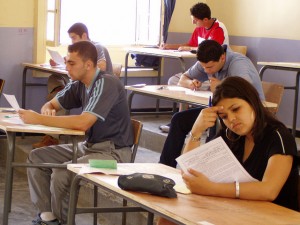
Although in recent years the number of young people (16 – 24 yrs old) using cannabis has declined, cannabis remains the most commonly used illicit drug, with up to 1 in 6 young people having used the drug in the last year (Home Office 2015).
Many things can potentially have an impact on young people who use drugs; amongst them are the short- and long-term effects on IQ and education outcomes, which have been previously explored in a range of studies. Commenting on new research back in 2014 one Elf said ‘…regular cannabis use before age 17 is linked with lower high school completion and degree attainment.’ (Tomlin, 2014)
So two years on, we have new research that examines the effect of early cannabis use on IQ and educational outcomes (Mokrysz et al, 2016).

1 in 6 young people use cannabis.
Methods
The authors used data from some participants of a larger cohort study. Out of the 4,621 participants in the cohort, 2,235 participants had sufficient data to conduct an analysis of the variables the researchers needed.
Information about use of cannabis was collected via a self-reported questionnaire when the participants were aged 15. Five categories of cumulative cannabis use were included, ranging from never used to used more than 50 times.
The participants IQ was measured at age 8 then again at age 15. Educational ‘key stage’ data including GCSEs was collected for the participants when they were aged 11 and 16.
Potential confounding factors were considered and data collected relating to the participants:
- Mothers use of substances, mental health and educational achievements
- Participants history of mental health
- Participants self-reported use of cigarettes, alcohol, ketamine, LSD, amphetamine, inhalants, ecstasy and cocaine.

This is a large cohort study, involving teenagers from the Avon Longitudinal Study of Parents and Children.
Results
When adjustments were made for confounding variables such as childhood behavioural problems, childhood depressive symptoms, other substance use and the mothers’ use of cannabis during pregnancy, cannabis use did not predict lower IQ performance or lower educational achievement.

Cannabis use was not correlated with lower IQ.
Conclusions
The authors concluded:
Our findings imply that previously reported associations between adolescent cannabis use and poorer intellectual and educational outcomes may be confounded to a significant degree by related factors.
And
The notion that cannabis use itself is casually related to lower IQ and poorer educational performance was not supported in this large teenage sample.
Strengths and limitations
- The type of cannabis used by these participants was not assessed, nor was the dose. The term cannabis is often used in research without differentiating between high and low potency varieties. This makes many of the seminal studies on cannabis less relevant.
- A strength and limitation is the period in time that this study was conducted. As higher potency forms of cannabis have overtaken lower potency forms in terms of availability and consumption in recent years, we can assume it is likely that the participants in this sample were exposed to higher potency cannabis, but we can’t be sure. This might account for some of the difference in findings compared to earlier studies on this topic.
- Relying on self-reported drug use can be unreliable, but the authors tried to reduce this limitation by including a fictional drug ‘spanglers’ in their questionnaire and excluded 3 participants who reported using it.
- Data was incomplete for 2,386 individuals in the original sample. Would this incomplete data have changed the results? This is significant as those young people who were excluded from school at the key data collection points would have been missing from this study. They are likely to be a vulnerable group and be at significant risk of problematic substance use.
- It is inferred but not clear if these were children who attended state school, therefore passively excluding privately educated and home educated children.
- A particular strength of this research is the way that confounding variables were considered and analysed. This goes some way to separate out the effect other substances might have influenced the outcomes measured.
- Assessment of outcome stopped at the age of 16, so we don’t know what the effects of cannabis use on IQ and educational outcome is for this cohort as they age.

Previous research results have been influenced by confounding variables.
Summary
What jumps out from this study is that the majority (91%) of the sample population mix tobacco with cannabis. Exposure to tobacco at this age raises concerns in terms of health and the potential for developing dependence on a legal drug. So we might have been too distracted by illicit drugs such as cannabis and not given sufficient attention to legal albeit regulated substances like tobacco. Untangling the impact of tobacco use on IQ, educational achievements and mental health problems such as psychosis is both challenging and urgent (Jauhar, 2014).
So how does this research help us advise our children, clients or their parents who are concerned about the effects of cannabis? What would you say to yourself as a teenager? It would be good to hear your advice, so please post a response and share your thoughts with fellow Elves…

Tobacco and cannabis use are inextricably linked.
Links
Primary paper
Mokrysz C, Landy R, Gage SH, Munafò MR, Roiser JP, Curran HV. (2016) Are IQ and educational outcomes in teenagers related to their cannabis use ? A prospective cohort study. Journal of Psychopharmacology 1–10. DOI: 10.1177/0269881115622241
Other references
Home Office (2015) Drug misuse: findings from the 2014/15 crime survey for England and Wales (PDF). (Accessed 26/1/16)
Tomlin A. Cannabis use in young people linked with lower high school completion and degree attainment. The Mental Elf, 10 September 2014:
Jauhar S. Cannabis, cigarette smoking and psychosis: do we need a rethink? The Mental Elf, 14 May 2014.

Does teenage cannabis use lower intelligence? https://t.co/5uDx1SsUxy #MentalHealth https://t.co/gP2m4CXC6n
@DrG_NHS new research on #cannabis & IQ useful information for all those in #mentalhealth via @Mental_Elf
https://t.co/g3ksCGhWpY
Hi @claimokr @soozaphone @MarcusMunafo We’ve blogged today about your teenage cannabis use study https://t.co/v09WtOCnj7 @ian_hamilton_
@ncpic @CannaBoss also this on the teenage brain & #cannabis via @Mental_Elf https://t.co/g3ksCGhWpY
Welcome to the woodland @ian_hamilton_ Fab debut blog on #cannabis and #IQ in young people https://t.co/v09WtOCnj7
many thanks @Mental_Elf so much to explore and learn in here, well worth a nosey around to see what you can find…
@BehindBras I think you’ll find this one useful for your readers via @Mental_Elf – https://t.co/g3ksCGhWpY
Does teenage cannabis use lower intelligence? https://t.co/yMd9sQ3z1t via @sharethis
So what advise should we give young people about #cannabis ? new research via @Mental_Elf – https://t.co/g3ksCGhWpY https://t.co/VTMyCtbQUV
Does teen cannabis use lower IQ? In simple terms, no. @ian_hamilton_ and @Mental_Elf offer a more nuanced answer: https://t.co/ggQ96ljEne
thanks for this @RickBrad1ey @Mental_Elf this research seems counter previous studies, more needed…
@ian_hamilton_ @RickBrad1ey @Mental_Elf Ian did you see the PNAS paper that came out a week after ours? Used twin design & found similar…
@soozaphone @RickBrad1ey @Mental_Elf thanks Suzi was it this one ?
https://t.co/J55zoFnabw
@ian_hamilton_ @RickBrad1ey @Mental_Elf yup – that’s the one!!
@soozaphone @ian_hamilton_ @Mental_Elf thanks
@soozaphone @ian_hamilton_ @Mental_Elf do you have a link?
@DrugPolRefoRRm this new research adds important info about #cannabis via @Mental_Elf https://t.co/g3ksCGhWpY
Does teenage cannabis use lower intelligence? https://t.co/Vq70Yz4JwH
RT @Mental_Elf: Teenage IQ and education
Has our obsession with #cannabis led us to ignore #tobacco?
https://t.co/v09WtOCnj7 https://t.co/0…
Does teenage #cannabis use lower #intelligence? https://t.co/O5HLI1RTrN @Mental_Elf looks at the #evidence from a large #cohortstudy
New high quality cohort study finds that cannabis use is not correlated with lower IQ https://t.co/v09WtOCnj7
Does teenage cannabis use lower IQ and academic achievment? https://t.co/g7Doamjl2q via @sharethis
RT @Mental_Elf: 1 in 6 young people use #cannabis
What impact is it having on their #IQ and #education?
https://t.co/27HWkHPhMZ https://t.c…
Catch @Mental_Elf @ian_hamilton_ blogging on new CPU research looking at links between cannabis use and IQ https://t.co/UsQ4WLdIhr
tobacco & #cannabis #marijuana are inextricably linked via @mentalelf https://t.co/g3ksCGhWpY https://t.co/EvBCW2RM5i
@JasonTron @UKLEAP new evidence on #cannabis & IQ might surprise you via @Mental_Elf https://t.co/g3ksCGhWpY
@TransformDrugs important new research on #cannabis has policy implications via @Mental_Elf https://t.co/g3ksCGhWpY
@ian_hamilton_ @Mental_Elf @TransformDrugs If we spent as much energy researching poisons like AD’s & Benzos as weed we might get somewhere.
RT @Mental_Elf: Association between cannabis use & poorer intellectual & educational outcomes is confounded by other variables https://t.co…
Don’t miss: Does teenage cannabis use lower intelligence? https://t.co/v09WtOCnj7
@Mental_Elf Maybe not, but the impact on mental health is clear. https://t.co/ANYHOulOVB
@Mental_Elf LOL. Most cannabis smokers also buy rislas so maybe this is a confounding variable and buying rislas actually causes psychosis.
@iCapsHealth @Mental_Elf high THC level in Weed cause psychosis THC is the trigger canaboids take triggers away THC level always much higher
@iCapsHealth @Mental_Elf Yes it is. Now ask…why is there no one in Mental Health doing any research? Answer is NO funding in Mental Health
@iCapsHealth @Mental_Elf More Research by Psychiatrists would prove dangers + the majority of weed smokers,and exactly WHO is doing Research
@Mental_Elf https://t.co/5TyL7RVKAs
@Mental_Elf Answer lies with teens experiencing psychosis..psychosis causes neurons to be overstimulated by dopamine, damage can happen here
@Mental_Elf Dopamine is a stimulator, THC is trigger to Dopamine release, Dopamine made in Limbic System, mania and psychosis happen here
Does teenage cannabis use lower your intelligence? https://t.co/xrLxxbzg6o
Does #marijuana lower intelligence ?
https://t.co/g3ksCGhWpY https://t.co/CsH3oI39b0
Most popular blog this week? It’s debutant @ian_hamilton_ Does teenage #cannabis use lower intelligence? https://t.co/v09WtOCnj7
@Mental_Elf fascinating research on important topic, good to see it is being read ,thanks for all the RT’s & comments,really appreciated
@Mental_Elf @ian_hamilton_ YES, for sure. Just went to an in-service done by psychiatrists. Can forward you the powerpoint if u r interested
@Mental_Elf @ian_hamilton_ Article is incorrect, do not listen to articles which are not written by full time working hosp psychiatrists
@Mental_Elf @ian_hamilton_ I cannot believe u would support such an article, weed triggers psychosis, esp teenagers…wow
@SherriSchmid @Mental_Elf thanks for your comments Sherri, & agree there is a link between #cannabis & psychosis but not sure exactly why ?
Interesting ?
Interesting article- would be interested to see the educational outcome for post 16 as think this would have more of an impact on discussions with clients and their children to refer to the longer term impacts
Thanks Laura, yes I agree that the longer term outcomes would be good to know.
I’m not sure that this particular ALSPAC cohort are old enough yet, so perhaps something for a follow-up study.
Cheers, André
That’s true- A follow-up study would be useful to see longer term outcomes.
Can see why its a popular blog though.
RT @CLEARUK: Does teenage #cannabis use lower intelligence? #breakthetaboo https://t.co/XL99RJHGuv https://t.co/HEhswz2PKL
Does teenage cannabis use lower IQ? https://t.co/2aTVo32HPG Research suggests not, criticises other studies re accounting for other factors
Does teenage cannabis use lower intelligence? https://t.co/mlUKFYFSS1 via sharethis @ian_hamilton_
Does teenage cannabis use lower intelligence? (The Mental Elf) https://t.co/z2rktaZ1n0
Does teenage cannabis use lower your intelligence? https://t.co/kvpzbwf1cX
[…] 1Does teenage cannabis use lower your intelligence?- Mental Elf Blog post. […]
#CHN204 @PUNC14 Does teenage cannabis use lower intelligence? https://t.co/drg1nLJoby via @sharethis
Hi @ian_hamilton_
You’ve won a #ClarityBadger
Does teenage cannabis use lower intelligence?
https://t.co/v09WtOCnj7 https://t.co/z5vcBgVd1q
@Mental_Elf fantastic ! many thanks
@Mental_Elf @ian_hamilton_ @aijeria what about the opposite results in the naturalistic Dunedin project? dose-rspnse https://t.co/2eehpPESuT
@jirecule @Mental_Elf @aijeria perhaps as there was longer follow up in Dunedin, but exposure to #cannabis type likely to be different
@ian_hamilton_ @Mental_Elf @aijeria thanks for answering. Could you expand? do you mean the THC content, or a mixup with other substances?
@jirecule @Mental_Elf @aijeria yes THC/CBD ratios differ over time, equally there could be mix up with other substances such as NPS…
@ian_hamilton_ @Mental_Elf @aijeria in Chile we observe a mixup with coca base paste, with a resulting schizophreniform syndrome. Also…
@ian_hamilton_ @Mental_Elf @aijeria …we rceive (biased clinical stting) pure THC-relatd anergic cgnitive syndromes. that’s why our intrest